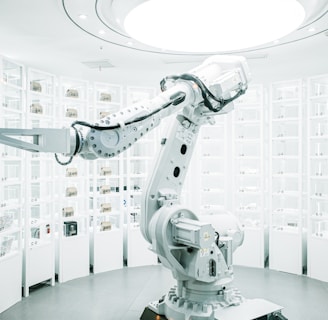Revolutionizing Healthcare: The Impact of Artificial Intelligence on Medical Advancements
Discover how Artificial Intelligence is revolutionizing healthcare with unprecedented advancements. Explore the transformative role of AI in medicine, from accurate diagnoses to personalized treatment, and its impact on healthcare costs.


Over the past few years, the medical industry underwent a drastic change because the acceptance and adoption of Artificial intelligence (AI) technology is very much widespread today. With its ability to glean insights from big volumes of data, pick up trends and forecast, AI has revolutionized the healthcare industry. This post delves into the incredible technology revolution happening in healthcare since embracing AI and how crucial it is. We’ll also look at how AI has affected total healthcare costs… up or down.
Advancements in Medicine and the Role of AIDiagnostic Accuracy: The one where AI has created the maximum impact on healthcare is through its help in diagnosis. Machine Learning algorithms can analyze medical imaging, including X-rays, MRI, and CT SCANS, to detect an abnormality or disease more precisely than ever before. For instance, the UK’s deep-learning lab, Google’s DeepMind, created an AI that identifies signs of diabetic retinopathy through retinal scans — helping with earlier diagnosis and treatment.
Reference: Ting, D. S. W. et al 2017. Design And Verification Of a Deep Learning System For Diabetic Retinopathy and Ophthalmic Disorders With Retinal Images In Multi-Ethnics Population Of Diabetics. JAMA, 318(22), 2211-2223.
Personalized Treatment Plans: It uses AI applications to analyze patients’ data to personalize the treatment plan. For one example, IBM’s Watson for Oncology helps oncologists pick the best-tailor-made cancer treatments by analyzing mountains of medical research articles, clinical trial data, and electronic files representing patient histories.
Reference: Somashekhar, S. P.; et al. (2018). Watson for Oncology and breast cancer treatment recommendations: consensus between experts in the multidisciplinary tumour. Annals of Oncology, 29(2), 418-423.Drug Discovery and Development: The potential candidate drugs can be predicted and effective in the application of drug discovery with the help of AI. AtomWise uses AI to simulate how drugs interact with target proteins at the molecular level greatly lowering the cost and time of drug discovery.
Reference: Smith, J. S., et al. (2021). Atomwise: AI for drug discovery. Expert Opinion on Drug Discovery, 16(11), 1189-1201.
Telemedicine: AI-powered chatbots and virtual health assistants offer immediate medical advice and support, reducing the burden on healthcare providers. Babylon Health's AI chatbot, for example, assists users in assessing their symptoms and provides recommendations for further action.
Reference: Shickel, B., et al. (2018). Deep EHR: A Survey of Recent Advances in Deep Learning Techniques for Electronic Health Record (EHR) Analysis. IEEE Journal of Biomedical and Health Informatics, 22(5), 1589-1604.
Predictive Analytics: AI analyzes historical patient data to predict disease outbreaks, patient readmissions, and resource allocation. Hospitals can optimize their operations and allocate resources more efficiently, improving patient care while reducing costs.
Reference: Obermeyer, Z., & Emanuel, E. J. (2016). Predicting the Future - Big Data, Machine Learning, and Clinical Medicine. The New England Journal of Medicine, 375(13), 1216-1219.
Impact on Healthcare Costs
The impact of AI on healthcare costs is nuanced:
Upfront Investment: Implementing AI systems in healthcare requires a significant initial investment in technology, training, and infrastructure. However, these costs can be outweighed by the long-term benefits.
Preventive Care: By enabling early disease detection and personalized treatment, AI can reduce long-term healthcare expenses associated with chronic conditions.
Operational Efficiency: AI-driven automation streamlines administrative tasks, reducing overhead costs and allowing healthcare providers to focus on patient care.
Resource Optimization: Predictive analytics help hospitals allocate resources more efficiently, preventing costly bottlenecks and reducing the need for excessive staffing.
Costly Drug Development: While AI expedites drug discovery, the high costs of clinical trials and regulatory approvals remain. However, AI can make the process more efficient.
Conclusion
Artificial Intelligence has undeniably revolutionized the medical industry by enhancing diagnostic accuracy, personalizing treatment plans, expediting drug discovery, enabling telemedicine, and optimizing healthcare operations. While the initial investment in AI technology can be substantial, its long-term benefits in terms of cost reduction and improved patient outcomes are undeniable. The future of healthcare is intricately tied to the continued integration and advancement of AI technology.
References:
Ting, D. S. W., et al. (2017). Development and Validation of a Deep Learning System for Diabetic Retinopathy and Related Eye Diseases Using Retinal Images From Multiethnic Populations With Diabetes. JAMA, 318(22), 2211-2223.
Somashekhar, S. P., et al. (2018). Watson for Oncology and breast cancer treatment recommendations: agreement with an expert multidisciplinary tumour board. Annals of Oncology, 29(2), 418-423.
Smith, J. S., et al. (2021). Atomwise: AI for drug discovery. Expert Opinion on Drug Discovery, 16(11), 1189-1201.
Shickel, B., et al. (2018). Deep EHR: A Survey of Recent Advances in Deep Learning Techniques for Electronic Health Record (EHR) Analysis. IEEE Journal of Biomedical and Health Informatics, 22(5), 1589-1604.
Obermeyer, Z., & Emanuel, E. J. (2016). Predicting the Future - Big Data, Machine Learning, and Clinical Medicine. The New England Journal of Medicine, 375(13), 1216-1219.
